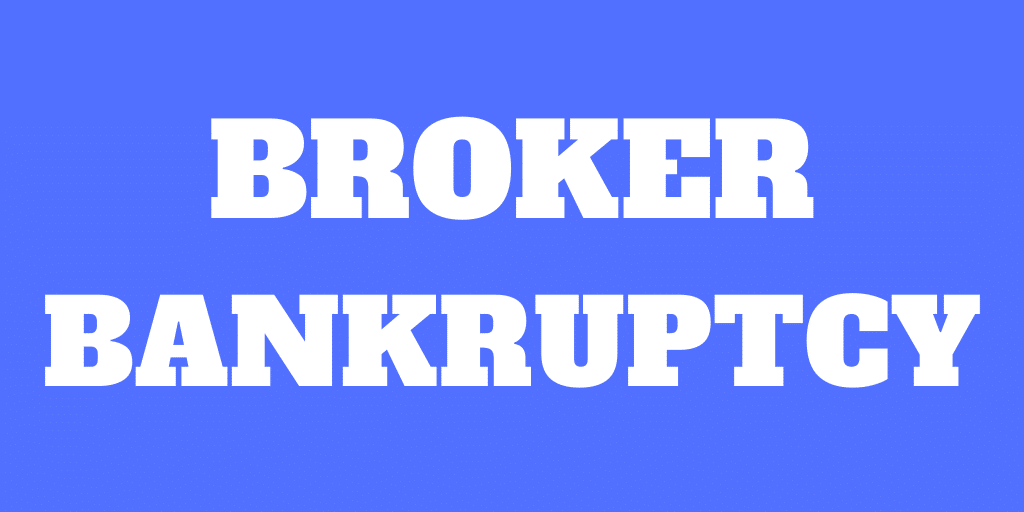(Disclosure: Some of the links below may be affiliate links) When you plan on living on your investments, you need to consider the safety of these investments. Some of them will be in your retirement accounts. But the bulk of your investments will be in your broker account. So, what happens if your broker goes bankrupt? Are we going to lose everything? In this article, we will see in detail what happens to our securities if a broker goes bankrupt. Broker Bankruptcy An online broker (or a bank offering brokerage services) can go bankrupt like any other company. In that case, it is important to know what would happen to our assets. It is especially important for people than want to retire based on these assets. If these people suddenly lost everything, they may be in big trouble. Online
Topics:
Mr. The Poor Swiss considers the following as important: Investing
This could be interesting, too:
Lance Roberts writes The Impact Of Tariffs Is Not As Bearish As Predicted
Lance Roberts writes Bull Bear Report – Technical Update
Lance Roberts writes Forecasting Error Puts Fed On Wrong Side Again
Lance Roberts writes Tariffs Roil Markets
(Disclosure: Some of the links below may be affiliate links)

When you plan on living on your investments, you need to consider the safety of these investments. Some of them will be in your retirement accounts. But the bulk of your investments will be in your broker account.
So, what happens if your broker goes bankrupt? Are we going to lose everything?
In this article, we will see in detail what happens to our securities if a broker goes bankrupt.
Broker Bankruptcy
An online broker (or a bank offering brokerage services) can go bankrupt like any other company. In that case, it is important to know what would happen to our assets. It is especially important for people than want to retire based on these assets. If these people suddenly lost everything, they may be in big trouble.
Online brokers are regulated. Now, the regulations will depend on where the broker is from. So, how well you are protected will depend on where your broker is located.
In this article, I am going to look at some of the regulations and protections in case of broker bankruptcy.
Swiss Brokers
Let’s start to see what would happen in the case of a Swiss Broker Bankruptcy.
In Switzerland, Swiss Banks are registered with FINMA. FINMA is the supervisory authority. If you have cash in your broker account, it will be protected by Swiss Deposit Insurance.
For securities, FINMA forces banks to use asset segregation. It means that the bank assets are held entirely separate from the client’s assets. The bank only acts as a custodian. This segregation will be done for most assets like stocks, ETFs, and bonds. But it will not be done by investments directly from the bank such as structured products.
And if your Swiss Broker is not a registered bank, it will use a licensed custodian bank to hold these assets in your name. In that case, it is more complicated to have the custodian bank go bankrupt rather than the broker goes bankrupt since the broker holds no assets.
Interactive Brokers
Interactive Brokers is an outstanding broker, with extremely affordable fees! Trade U.S. security for as little as 0.5 USD!
Interactive Brokers is available to Swiss Investors but is not a Swiss Broker. As such, it will have different regulations. With Interactive Brokers, it is a bit complicated because they have several entities in different countries. For instance, the main entity is IB US, which is regulated by the United States.
As a Swiss Investor, we invest with Interactive Brokers UK. These accounts are regulated by the United Kingdom’s regulatory services. But we have an extra layer of security provided by the Securities Investor Protection Corporation (SIPC) from the United States. It is due to the way IB is organized.
With SIPC, you have protection for up to 500K USD if the broker goes bankrupt. There is a limit for 250K of cash on that. So, you have excellent protection, currently the best available.
On top of that, Interactive Brokers also segregate assets from clients. It means that all your securities are held in an account in your name, in a custodian entity.
Due to Brexit, many accounts are now moved from IB UK to other IB entities in the European Union, such as Luxembourg (IB LUX). So, if your account is moved from the IB UK entity to an IB EU entity, you will now be protected like any other EU brokers. It really sucks because we are going to lose the extra SIPC protection. You can look at the next section to see what that means.
For more information, I have a full review of IB.
DEGIRO
DEGIRO is a broker from the Netherlands. In August 2020, DEGIRO has been bought by Flatex Bank AG. It is regulated by the Authority for the Financial Markets (AFM) and the Dutch Central Bank (DCB). In some countries where it operates, it also has some extra regulators, for instance, in the UK.
DEGIRO has the standard European layer of protection. With this protection, 100’000 EUR of cash and 20’000 EUR of assets are insured in case of a broker bankruptcy.
Once again, DEGIRO assets are held separately (asset segregation) from the client’s assets. A different legal entity (SPV) is used for that. So, again, if DEGIRO bankrupts, your shares will be held in the custodian legal entity.
For more info, read my review of DEGIRO.
Asset Segregation
As you can see, the main protection against broker bankruptcy is asset segregation. Your assets should be held separately from the broker’s assets themselves.
If the broker goes bankrupt, the segregated assets cannot be claimed by the creditors of the failed broker. After the bankruptcy has settled, they will need to find another broker to handle the assets. Once this is done, you will have access to your shares again.
We do not really have good examples of this happening to know how well this will work in practice. I am expecting that this process will last a long time. I would not be surprised if it would take more than a year to get back access to the shares.
Keep in mind that asset segregation does not mean that assets are held in your name. Most brokers will pool all the securities in a big account (called omnibus or nominee accounts generally). Of course, there is still an indication as to which customers have which share linked to this account. But for cost reasons, most brokers will not have individual custodian accounts.
Asset Segregation is a great tool for normal bankruptcies. But, in the case of fraud or possible negligence, this asset segregation could have been compromised. In that case, the process can be extremely complicated. And at least part of the assets would likely be lost.
Securities Lending
When a broker lends your shares to another investor, the share is not entirely yours during the loan duration. So, what happens if the broker bankrupts during this time?
For instance, securities lending is something DEGIRO is doing by default with its DEGIRO Basic account. When they lend your shares, they borrow your securities from the legal entity. Now, if DEGIRO goes bankrupt, the borrower of the loan still owes you that loan.
But there is still the extra risk of the borrower going bankrupt too. And investors borrowing shares are more likely to go bankrupt than others.
There is a definite extra risk in case of a broker bankruptcy if this broker uses securities lending. It is not a huge risk, but it will make it more complicated to recover all your shares.
Direct Registration
Many people think that all their shares are directly registered in their names. But in most cases, this is wrong.
As mentioned before, your assets are generally held in big omnibus accounts. And only the segregation legal entity is aware of which investor holds which shares.
There are some systems by which you could register shares in your name.
For instance, in the United States, the Direct Registration System (DRS) can do just that. It is like an official registration system for share ownership. And with U.S. brokers, you can arrange your trades to be registered in this system. That way, your shares are really held in your name.
Doing so will help in case of broker bankruptcy since then your claim is directly with the company of the share and not the intermediary (the broker).
In Switzerland, we have a system of share registers. With some brokers, you can register the ownership of your shares in a share register. These are public registers for publicly-traded companies. It is a very different system since the share will still be held by the broker. But you will have a public official trace of the shares.
Now, this system will make it more complicated to buy and sell shares. And there is no unified share register for all stock exchanges. So, the rules will be different from country to country.
I do not think it is necessary or even practical to do that for all your shares to protect against broker bankruptcy.
Protect against Broker Bankruptcy
What can you do to protect yourself against broker bankruptcy?
The best protection against broker bankruptcy is to use a well-established and reputable broker. For me, Interactive Brokers is excellent in that regard. It was established more than 40 years ago and has an excellent reputation.
And you need to make sure to use a broker that enforces asset segregation. It is essential. Asset Segregation is the best protection against broker bankruptcy. Any broker that does not segregate assets should not be considered safe.
If you really want an extra layer of security, the only thing you can do is have several broker accounts. For instance, you could have some of your investments with Interactive Brokers and some Investments with a large Swiss Broker. In that case, if one of them goes bankrupt, you can still live from your investments in the second broker account.
However, having two broker accounts will make your investing significantly more complicated. And this will mean that you will not only use the best broker in Switzerland but a second one. But this could be worth the cost if it helps you sleep at night.
Conclusion
The main protection against broker bankruptcy is asset segregation. Assets of the clients of the broker are not held in the same entity as the assets of the broker itself.
So, in case of the broker going bankrupt, the creditors of the bankrupt will not be able to claim the assets of the client. This is an essential protection.
This protection is enforced for Swiss Brokers, Interactive Brokers, and DEGIRO. If you use another broker, you should definitely verify that your assets are segregated. I would not recommend using a broker where this is not the case.
In this article, I have talked mostly about broker bankruptcy. But there is another risk in the case of broker fraud or negligence. In that, asset segregation may not work since the segregation could have been compromised. We have seen that there are some levels of protection for these assets (20K EUR for European brokers, for instance), but it is unlikely to be enough.
I am going to try to talk about broker fraud and protection against it in a future article.
Are you afraid of broker bankruptcy? How do you protect against it?

